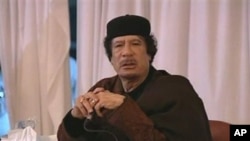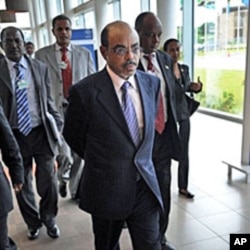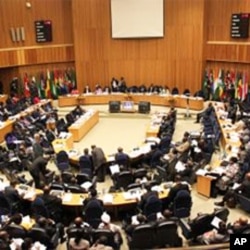An African Union committee is meeting this week to consider a proposal by Libyan leader Moammar Gadhafi to transform the AU bureaucracy into a powerful continental authority. The eccentric Libyan leader still casts a long shadow over African affairs, even as his 42-year rule is under threat at home.
Gadhafi's vision: United States of Africa
The proposal is often referred to as the United States of Africa. For years, Moammar Gadhafi has relentlessly pursued his vision of a European-style union with broad authority over the continent, including a standing army.
Though he denies it, many African leaders believe Gadhafi sees himself as the future chief of this continental body, the "king of kings."
At summit after African summit, Gadhafi has pushed the union issue forward, despite opposition from other heads of state irritated by his arrogance, and concerned that he was trying to move too fast.
African diplomats say summit sessions devoted to creating the authority were brutal, with a powerful anti-Gadhafi leadership bloc making it clear they see the idea as premature.
Those summit squabbles are usually kept behind closed doors. But with Libya embroiled in civil war, one leader of the anti-Gadhafi faction offered a rare glimpse into the organization’s inner workings.
Zenawi criticism
Amid reports that African mercenaries are fighting alongside Libyan troops, Ethiopian Prime Minister Meles Zenawi said any of his countrymen joining pro-Gadhafi forces would be seen as "despicable criminals."
"Everyone knows we have had our differences with the authorities in Libya. And we have had them in public, we have had them in private," Zenawi said. "So there is no possibility whatsoever of any Ethiopian fighting on the side of the current government in Libya. That would be a criminal act."
Still, Gadhafi wields great influence within the African Union. His policy of using Libya’s oil wealth to aggressively pursue his pan- Africanist vision has paid rich dividends.
Contributions
Libya’s annual dues amount to nearly 15% of all contributions from the 53 AU member states. In addition, Gadhafi pays the dues of several poorer countries, an estimated $40 million a year in all.
So when the international community asked for African support this month for a "no fly zone" and sanctions against Libya, the continental body pretended not to hear. AU watcher Delphine Lecoutre of the French Center for African Studies at Addis Ababa University says even leaders who find Gadhafi’s behavior repugnant fear his wrath if the organization should anger him.
"Libya is a very special state. This is one of the fears. If Libya is sanctioned for what's going in the country currently, it could lead the country to withdraw from the AU," said Lecoutre. "And of course in that case it could have implications because Libya is one of the big five contributors to the organization."
Influence
So this week, even with Gadhafi’s fate in Libya in doubt, experts are gathered at AU headquarters to consider making his pan-African dream a reality.
Chief AU legal counselor Ben Kioko, however, says the continental authority concept being discussed here has long ago outgrown the seed planted by Moammar Gadhafi.
"Even though the original idea may have come from Gadhafi, it doesn’t mean it is his idea now, because whatever he proposed was discussed, amended and then owned by the assembly," said Kioko.
Supporters see the current AU authority concept as a means to build a desperately needed continental infrastructure. Nigerian legal expert Richard Nzerem says the authority could also defend small and relatively weak African nations against divide-and-rule tactics employed by big foreign powers.
"There’s a feeling that the more we operate as single sovereign nations, the easier it is for the people who want to influence certain states in certain directions to achieve their aims," said Nzerem. "But if they work through a central union government, it would be more difficult for the divide-and-rule policy to succeed."
Hopes for AU's future
Another committee member, Ghana’s Kofi Kumado, foresees the day when Africans will be able to travel freely between AU member countries, just as Europeans do within Europe.
"I’m quite optimistic that ten years from now I probably won’t need a visa to come to Addis Ababa or to go to many other African countries because the harmonization process has already begun," said Kumado.
Libya’s civil war leaves open the question of whether Gadhafi will be around to realize his vision of a United States of Africa. AU watchers say he is more likely to be remembered as a symbol of an era of African despots who stayed in power too long.
But even his detractors admit the Libyan leader is forcing the leaden African Union bureaucracy to take a critical look at itself, and to think about the future.






